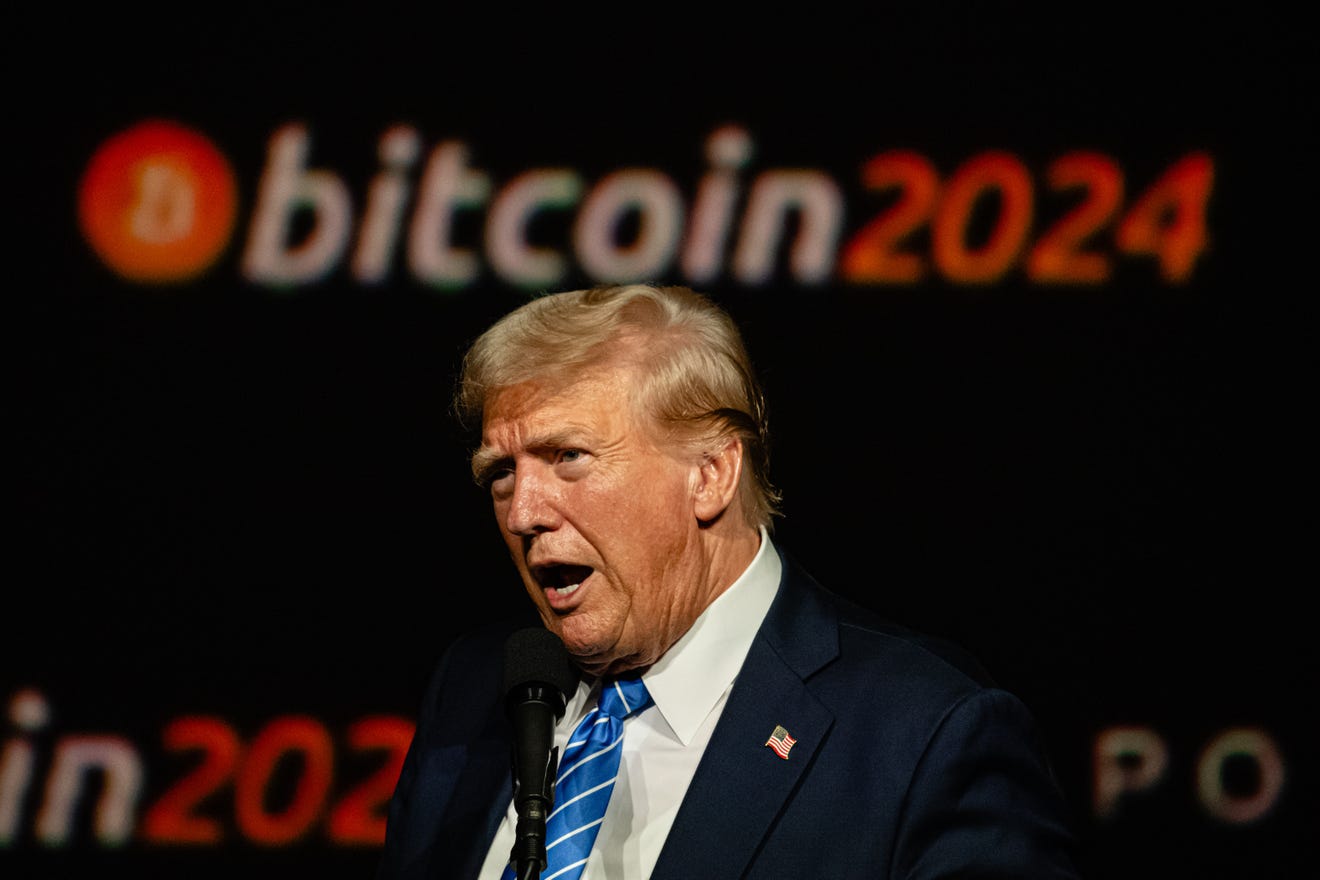Trump's Economic Policies And Their Potential Effect On Bitcoin Price

Table of Contents
Fiscal Stimulus and Inflation's Impact on Bitcoin
Trump's administration implemented significant fiscal stimulus measures, including tax cuts and increased government spending. These actions could lead to increased inflation, potentially impacting Bitcoin's price.
Increased Government Spending and Inflation
Increased government spending, without a corresponding increase in productivity, can lead to inflation. Inflation erodes the purchasing power of fiat currencies, making investors seek alternative assets to preserve their wealth. Bitcoin, often viewed as a hedge against inflation, could become more attractive during periods of high inflation.
- Historical Correlation: Examining historical data reveals a tentative positive correlation between periods of high inflation and Bitcoin price increases. However, this correlation isn't always linear and other factors are at play.
- High Inflation Scenarios: In scenarios of hyperinflation, Bitcoin's price could experience significant gains as investors flee depreciating fiat currencies. However, this is speculative and depends on various factors, including regulatory responses.
- Potential Downsides: Ironically, high inflation could also lead to increased government regulation of cryptocurrencies in an attempt to control the situation. This could negatively impact Bitcoin's price.
Tax Cuts and Their Ripple Effect
Trump's tax cuts aimed to stimulate economic growth by increasing disposable income. This could indirectly influence Bitcoin investment.
- Increased Disposable Income: Increased disposable income could lead to a portion of this additional capital being allocated to alternative investments, including cryptocurrencies like Bitcoin.
- Economic Growth and Volatility: The overall impact of tax cuts on economic growth and subsequently on Bitcoin's price is complex. While increased economic activity can be positive, it can also contribute to price volatility.
- Wealthy Investor Investment: High-net-worth individuals, benefitting disproportionately from tax cuts, may allocate a portion of their tax savings towards Bitcoin as a diversification strategy or a hedge against inflation.
Trade Wars and Geopolitical Uncertainty's Role
Trump's trade protectionist policies and confrontational approach to international relations created significant geopolitical uncertainty. This uncertainty can drive investors towards Bitcoin as a safe-haven asset.
Trade Protectionism and Safe-Haven Assets
Periods of geopolitical instability often see investors seeking safe-haven assets, including gold and, increasingly, Bitcoin. Trump's trade wars and protectionist measures contributed to this uncertainty.
- Historical Precedent: Bitcoin has historically shown resilience and even price increases during periods of global political turmoil and uncertainty.
- Investor Confidence and Flight to Safety: Uncertainty undermines investor confidence in traditional markets. This leads to a "flight to safety," where investors move towards assets perceived as less risky, including Bitcoin.
- Impact of Sanctions: International sanctions and trade disputes can disrupt global financial systems, potentially increasing the appeal of decentralized assets like Bitcoin.
Dollar's Strength and Bitcoin's Inverse Correlation
The strength of the US dollar, potentially influenced by Trump's policies, can have an inverse relationship with Bitcoin's price.
- Historical Data Analysis: Historical data shows a tentative inverse correlation between the US dollar index and Bitcoin's price. A weakening dollar often correlates with Bitcoin price increases and vice-versa. However, this correlation is not absolute.
- Weakening Dollar and Bitcoin: A weakening dollar could make Bitcoin a more attractive investment for international investors, driving up demand.
- Other Influencing Factors: It's crucial to remember that many factors beyond Trump's policies influence the dollar's strength, making it difficult to isolate the direct impact on Bitcoin.
Regulatory Changes and Their Influence
Trump's administration's approach to regulation, characterized by a mix of deregulation and occasional increased scrutiny, significantly impacted the cryptocurrency landscape.
Deregulation and its Implications for Crypto
The potential for deregulation, while not fully realized under Trump, could have positively impacted the cryptocurrency market.
- Increased Adoption: Reduced regulatory scrutiny could have encouraged greater Bitcoin adoption by making it easier for businesses and individuals to interact with the cryptocurrency market.
- Market Manipulation Risk: Less regulation also increases the risk of market manipulation and fraudulent activities, potentially negatively affecting Bitcoin's price.
- Differing Jurisdictional Approaches: Varying regulatory approaches across different countries could create arbitrage opportunities but also increase complexity for global Bitcoin trading.
Increased Scrutiny and its Potential Impact
Despite periods of relative deregulation, increased regulatory scrutiny of cryptocurrencies remained a potential threat.
- Impact on Liquidity and Confidence: Stricter regulations can reduce market liquidity and negatively impact investor confidence, potentially leading to lower Bitcoin prices.
- Increased Compliance Costs: Increased regulatory compliance for cryptocurrency exchanges and businesses can increase operating costs, which could indirectly affect Bitcoin's price.
- Long-Term Effects: The long-term effects of stricter regulations on Bitcoin's future price are complex and depend on the specific nature and implementation of those regulations.
Conclusion
This article explored the multifaceted relationship between Trump's economic policies and their potential impact on Bitcoin's price. Factors like fiscal stimulus, trade wars, and regulatory changes all played a significant role in shaping the cryptocurrency market during this period. The interplay of these factors resulted in a volatile and often unpredictable price trajectory for Bitcoin.
Call to Action: Understanding the complex interplay between macroeconomic policies and cryptocurrency markets is crucial for investors. Continue your research into Trump's Economic Policies and their impact on Bitcoin's price to make informed decisions. Stay informed about the latest developments in both economics and cryptocurrency to navigate this dynamic landscape.

Featured Posts
-
 Bone Bruise Sidelines Jayson Tatum Game 2 Participation Uncertain
May 09, 2025
Bone Bruise Sidelines Jayson Tatum Game 2 Participation Uncertain
May 09, 2025 -
 Rio Ferdinand Changes Champions League Final Prediction Arsenal Or Psg
May 09, 2025
Rio Ferdinand Changes Champions League Final Prediction Arsenal Or Psg
May 09, 2025 -
 Bitcoin Madenciligi Karliligini Kaybediyor Neden Ve Ne Yapmali
May 09, 2025
Bitcoin Madenciligi Karliligini Kaybediyor Neden Ve Ne Yapmali
May 09, 2025 -
 Analysis India Overtakes Uk France And Russia In Latest Power Index
May 09, 2025
Analysis India Overtakes Uk France And Russia In Latest Power Index
May 09, 2025 -
 Kak Snegopad Povliyal Na Rabotu Aeroporta Permi
May 09, 2025
Kak Snegopad Povliyal Na Rabotu Aeroporta Permi
May 09, 2025
Latest Posts
-
 Kaitlin Olson And The High Potential Repeats On Abc In March 2025
May 09, 2025
Kaitlin Olson And The High Potential Repeats On Abc In March 2025
May 09, 2025 -
 High Potential Repeat Episodes On Abc In March 2025 Analyzing The Programming Strategy
May 09, 2025
High Potential Repeat Episodes On Abc In March 2025 Analyzing The Programming Strategy
May 09, 2025 -
 How To Check Madhyamik Result 2025 And Merit List
May 09, 2025
How To Check Madhyamik Result 2025 And Merit List
May 09, 2025 -
 The High Potential Of David A New Perspective On Morgans Weaknesses
May 09, 2025
The High Potential Of David A New Perspective On Morgans Weaknesses
May 09, 2025 -
 Madhyamik 2025 Result Date Merit List And Passing Percentage
May 09, 2025
Madhyamik 2025 Result Date Merit List And Passing Percentage
May 09, 2025
